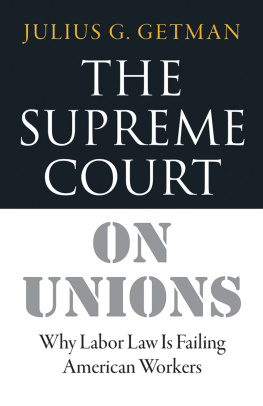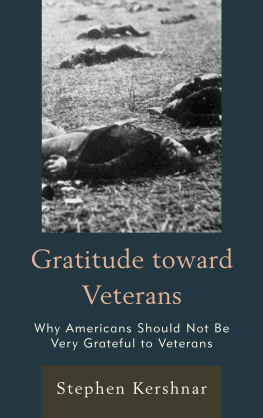
The Veterans Treatment Court Movement
The Veterans Treatment Court Movement provides a comprehensive, empirical analysis of the burgeoning veterans court movement from genesis through to operation, and concluding with comments on its societal relevance. Beginning with the unlikely convergence of therapeutic jurisprudence with the oft-misunderstood warrior ethos that undergirds the entire movement, the text examines every component of veterans courts, weighing the cultural, legal, and practical strengths and limitations of these programs. Each chapter assesses key components of the court, including the participants, law enforcement, judges, prosecution, defense counsel, court administration, data management, the Veterans Justice Outreach Officer (VJO), probation, mentors, and the community. The book concludes with recommendations on how these courts can further integrate with communities, maximize efficiency, and improve.
The book shows how veterans courts seek to serve veterans legal, social, and psychological needs, and how they serve more than just offending veterans by allowing law-abiding veterans, many of whom suffered greatly when they transitioned out of military service, to exorcize their own demons and integrate their experiences into a socially recognized system of care. Incorporating program evaluation with sociological considerations, this monograph offers a comprehensive, considered examination of how and why these courts operate, and provides a foundation for future development. The volume provides essential background for scholars studying law and the criminal courts, as well as policymakers, judges, academics, students, and practitioners concerned with effective jurisprudence.
Anne S. Douds is Assistant Professor of Public Policy at Gettysburg College in Pennsylvania and a retired trial attorney. She received her B.A. in Political Science from Duke University, her J.D. from Emory University School of Law, and her Ph.D. in Justice, Law and Crime Policy from George Mason University. Her teaching and research interests include constitutional law, civil rights law, victims rights and advocacy, problem-solving courts, and social justice.
Eileen M. Ahlin is an Assistant Professor of Criminal Justice in the School of Public Affairs at Penn State Harrisburg. She received a B.A. in Administration of Justice and Sociology (multiple major) from Penn State University and her M.A. in Sociology (focus on crime, delinquency, and corrections) from George Mason University. She earned her Ph.D. in Criminology and Criminal Justice from the University of Maryland, College Park. Dr. Ahlin was a 2016 recipient of the National Institute of Justices W.E.B. DuBois Fellowship. Her research and teaching interests include corrections, violence, criminological theory, and neighborhood effects.
Directions and Developments in Criminal Justice and Law
www.routledge.com/Directions-and-Developments-in-Criminal-Justice-and-Law/book-series/DDCJL
The ways in which crime is constructed in society is of time-honored interest to criminologists across the globe. The ever-changing landscape of what is criminal and what is not affects scholars and policymakers in their approach to the body of law defining prohibited conduct, how that law evolves, and the modes by which it is administered. Rule of law cannot exist without a transparent legal system, strong enforcement structures, and an independent judiciary to protect against the arbitrary use of power. Critical consideration of the mechanisms through which societies attempt to make the rule of law a reality is essential to understanding and developing effectual criminal justice systems. The Directions and Developments in Criminal Justice and Law series offers the best research on criminal justice and law around the world, offering original insights on a broadly defined range of socio-legal topics in law, criminal procedure, courts, justice, legislation, and jurisprudence. With an eye toward using innovative and advanced methodologies, series monographs offer solid social science scholarship illuminating issues and trends in law, crime, and justice. Books in this series will appeal to criminologists, sociologists, and other social scientists, as well as policymakers, legal researchers, and practitioners.
Criminal Law and Precrime: Legal Studies in Canadian Punishment and Surveillance in Anticipation of Criminal Guilt
Richard Jochelson, James Gacek, Lauren Menzie, and Kirsten Kramar
Manufacturing Crime: The Markets Role in Crime Control
John Brent and Peter Kraska
The Evolving Role of the Public Prosecutor: Challenges and Innovations
Edited by Victoria Colvin and Philip Stenning
The Veterans Treatment Court Movement
Striving to Serve Those Who Served
Anne S. Douds and Eileen M. Ahlin
First published 2019
by Routledge
52 Vanderbilt Avenue, New York, NY 10017
and by Routledge
2 Park Square, Milton Park, Abingdon, Oxon, OX14 4RN
Routledge is an imprint of the Taylor & Francis Group, an informa business
2019 Taylor & Francis
The right of Anne S. Douds and Eileen M. Ahlin to be identified as authors of this work has been asserted by them in accordance with sections 77 and 78 of the Copyright, Designs and Patents Act 1988.
All rights reserved. No part of this book may be reprinted or reproduced or utilized in any form or by any electronic, mechanical, or other means, now known or hereafter invented, including photocopying and recording, or in any information storage or retrieval system, without permission in writing from the publishers.
Trademark notice: Product or corporate names may be trademarks or registered trademarks, and are used only for identification and explanation without intent to infringe.
Library of Congress Cataloging-in-Publication Data
Names: Douds, Anne S., author. | Ahlin, Eileen, author.
Title: The veterans treatment court movement : striving to serve those who served / Anne Douds & Eileen Michelle Ahlin.
Description: Abingdon, Oxon ; New York, NY : Routledge, 2019. | Series: Directions and developments in CJ & law | Includes index.
Identifiers: LCCN 2018034966 | ISBN 9781138393745 (hardback)
Subjects: LCSH: Alternatives to imprisonmentUnited States. | CriminalsRehabilitationUnited States. | VeteransUnited States. | VeteransServices forUnited States. | Criminal justice, Administration ofUnited States.
Classification: LCC HV9304 .D68 2019 | DDC 364.3086/ 970973dc23
LC record available at https://lccn.loc.gov/2018034966
ISBN: 978-1-138-39374-5 (hbk)
ISBN: 978-0-429-40156-5 (ebk)
Typeset in Bembo
by Wearset Ltd, Boldon, Tyne and Wear
Eileen would like to dedicate this book to Sgt. William J. Ahlin, USMC, who is a steadfast example of unwavering commitment and service to others.
Anne would like to dedicate this book to Doug Douds and Asha Withers for their love and support.
Contents
We would like to acknowledge and thank the many veterans treatment court practitioners, participants, and mentors who spent countless hours talking with us about their programs. We are indebted to their desire to share their processes with us, so the veterans treatment court movement story unfolds accurately and with a healthy dose of boots-on-the-ground reality.












